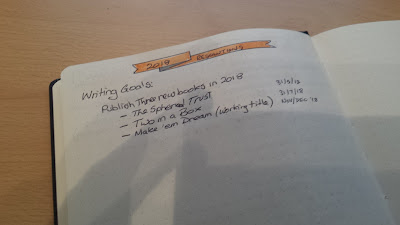It could be said that I have a lot of notebooks. Do not ever let me near another stationery shop. Ever! Sew up my pockets. I wonder if there's such an organisation as NA (Notebooks Anonymous) that I might join.
Well, after getting up at four AM this morning, with a burning urge to start indexing all the material in my notebooks, I realised I needed help, (although I found some cracking story ideas that I'd forgotten about).
Anyway, I'm trying something new. Not just another notebook, this time I'm trying a different kind of notebook. I'm trying a Bullet Journal, and New Year's Eve seems as good a time as any to start.
So what is a Bullet Journal?
Well, I couldn't help it. I've spent money on the official, shop-bought, bullet journal layout, but really it can be done with any notebook because it's a method more than a physical item. Bullet journalling appears to be a cross between a diary and a notebook. A word of caution, though. I haven't started yet, so anything I say here can, and probably is, wrong. But maybe there is no such thing as wrong. Maybe there are just different ways. But, hey, there's a website with videos you can watch that explain the process far better than I can, here.
In short, it's all about rapid logging, which uses bullet symbols to categorise and organise all the different kinds of notes, such as tasks, migrated tasks, scheduled tasks, etc. There are three types of log: The Future log, the Monthly Log, and the Daily Log. Items from the short, bulleted monthly log are either actioned, scheduled or pushed forward. The whole thing is flexible and can contain notes sketches, appointments... anything. My daily log already has sections for story ideas, blog ideas, writing goals for 2018, and for recording my daily writing progress. There is no limit to how the system can be used. And central to it all is an index system – and this is a big deal for me – in which you can find the notebook entries that you know you made and can't remember where you put them. Only this week I spent hours searching for some notes I made about my ongoing travel book project. I can't remember which notebook they're in (and I have more than the small stack shown above, believe me) or they could be in one of my many Evernote notebooks – which should be easier to find if I could remember the right tag words.
Anyway, depending on where in the world you're reading this, 2018 is here or drawing close. I've written my resolutions in my Bullet Journal, and I'm even nuts enough to share them below.
All that remains is for me to wish you all a Happy and Prosperous New Year!
Mjke Wood is the author of the Sphere of Influence series. Deep Space Accountant and The Lollipop of Influence are available now. The Spherical Trust will be published in 2018. Visit www.mjkewood.com for details of how to get your copy of his short story collection, Power for Two Minutes and Other Unrealities, for free.


















